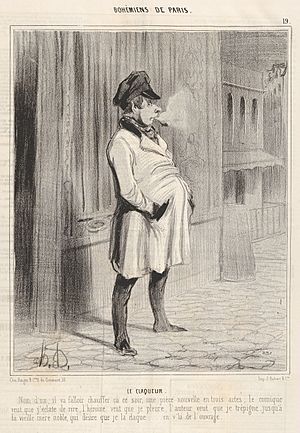Claque facts for kids

A claque is a group of people hired to applaud during a show, especially in old French theatres and opera houses. The people in a claque are called claqueurs. Their job was to make sure the audience reacted in a certain way, usually with lots of applause!
Contents
The History of Claques
Applause for Hire: Ancient Times to Today
Hiring people to clap for performances is not a new idea. It happened even in ancient times. For example, the Roman Emperor Nero had 5,000 of his soldiers cheer for him when he performed.
This old idea inspired a French poet named Jean Daurat (1508-1588). He wanted his plays to be a big hit. So, he bought many tickets and gave them away. In return, people promised to applaud his plays.
Claques Become Organized
Around 1820, claques became much more organized. An agency in Paris opened just to manage and provide claqueurs for shows. By 1830, claques were a normal part of theatre life.
A theatre or opera house manager could order as many claqueurs as they needed. These claqueurs usually worked under a leader called a chef de claque. This leader decided when and where the claqueurs should applaud.
Different Kinds of Claqueurs
Claqueurs had different roles to play:
- Commissaires (officers) learned the play by heart. They would point out the good parts to people sitting near them between acts.
- Rieurs (laughers) laughed loudly at all the jokes.
- Pleureurs (criers) were usually women. They pretended to cry, holding handkerchiefs to their eyes during sad parts.
- Chatouilleurs (ticklers) tried to keep the audience in a good mood.
- Bisseurs (encore-ers) simply clapped and shouted "Bis! Bis!" This was a French way to ask for an encore, meaning they wanted the performers to do more.
Claques Spread and Face Challenges
The idea of claques spread to other countries. You could find them in Italy (like at La Scala in Milan), Vienna, London (at Covent Garden), and New York (at the Metropolitan Opera).
Sometimes, claqueurs would try to get money from singers. Before a singer's first big show, the chef de claque might contact them. They would ask for money to make sure the singer got applause instead of being booed.
The famous composer Richard Wagner even stopped his opera Tannhäuser from being performed in Paris. This happened after a claque from the Jockey Club kept interrupting the show in 1861.
Later, important conductors like Arturo Toscanini and Gustav Mahler tried to stop claques. They wanted audiences to applaud naturally, as part of good concert manners.
Most claques disappeared by the mid-to-late 1900s. However, sometimes people are still paid to applaud at performances. A well-known example is with the Bolshoi Ballet.
See also
 In Spanish: Claque para niños
In Spanish: Claque para niños
- Astroturfing
- Cheerleading
- Laugh track
- Shill
- Social proof
 | Sharif Bey |
 | Hale Woodruff |
 | Richmond Barthé |
 | Purvis Young |

